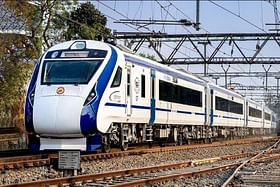Union Minister of Railways Ashwini Vaishnaw has announced that the government is set to introduce the Vande Metro and Vande Sleeper trains in the first half of next year.
Vaishnaw, who successfully resolved production hurdles for the indigenous Vande Bharat semi-high speed and self-propelled train, outlined the government’s vision to expand the Vande Bharat series with a sleeper version for distances exceeding 500 km.
Explaining the roadmap, Vaishnaw stated that the Vande Metro is being developed for journeys up to 100 km, while the Vande Bharat chair car is designed for distances ranging from 100-500 km.
The Vande Metro and Vande Sleeper are currently in the design phase, the minister said.
“Metro should be coming by January and Sleeper by March of next year,” he said, reports Indian Express.
Vaishnaw expressed confidence that the Vande Bharat trains would soon be produced at an accelerated pace, with a target of rolling out at least two new trains per week, aiming to connect every state in India.
Vaishnaw said that the production process for 400 Vande Bharat trains has commenced, with a current rollout rate of one train every eight days.
He further stated that the frequency of train production will soon increase to practically one train every third day.
Vaishnaw said that the first target of the government is to connect every state in India with Vande Bharat trains, and the ministry aims to achieve this milestone by the middle of June.
“After that we will take routes which are very busy,” he said.
Furthermore, the minister also highlighted the significant strides made by the Railways Ministry in track infrastructure.
Vaishnaw revealed that last year alone, around 5,200 km of rail tracks were constructed, averaging a record-breaking 14 km per day.
In addition to new track construction, the ministry is also upgrading existing tracks, with an annual renewal of approximately 8,000 km.
These upgraded tracks will be capable of accommodating higher speeds, with some sections capable of supporting speeds over 160 km per hour, a significant enhancement from the previous limit of 70-80 km per hour, according to the minister.


